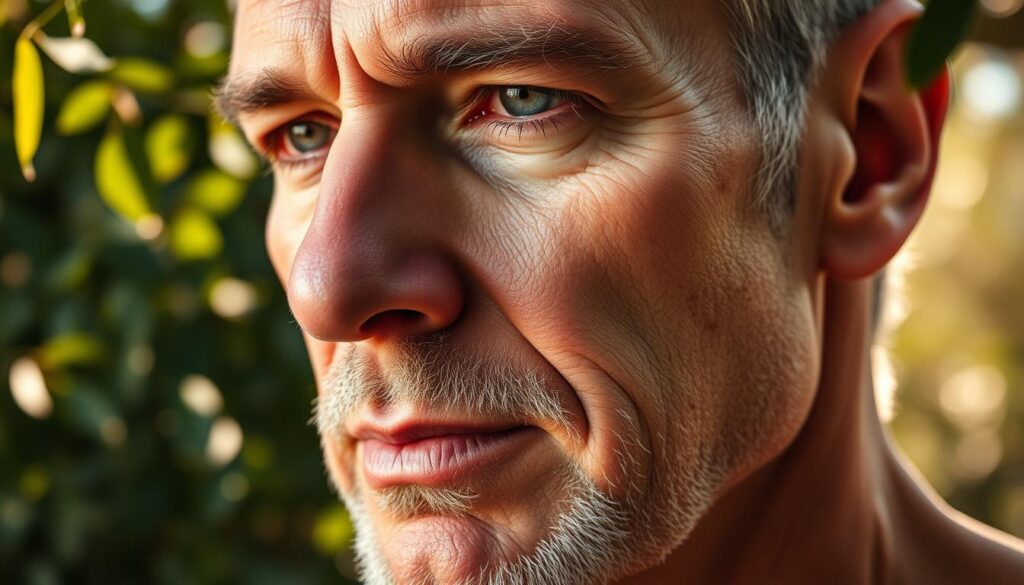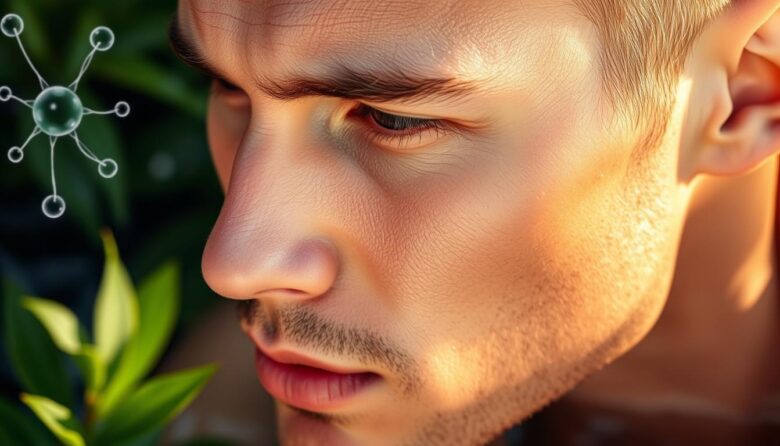As we get older, our skin health often gets worse. For men over 40, this is a big worry. Testosterone is key to keeping our skin healthy. When testosterone levels drop, so does our skin’s health.
At DietGuru.com, we focus on helping men over 40 improve their health and look better. We’re here to help you with Dr. John Spencer Ellis. Start improving your health, hormones, and appearance on testosterone replacement therapy for men to tackle skin problems linked to low testosterone.
Key Takeaways
- Testosterone levels may decline by about 1% per year after age 30, affecting skin health in men over 40.
- Testosterone is essential for maintaining skin elasticity, firmness, and hydration.
- Men with hypogonadism reported improvements in mood and well-being after testosterone therapy, which can also benefit skin health.
- Healthy lifestyle factors like diet and exercise are necessary for maximizing testosterone treatment effectiveness and improving skin health.
- Testosterone replacement therapy can help address skin issues related to low testosterone levels in men over 40, but it’s essential to consult with a healthcare professional.
- By optimizing hormones and overall health, men can improve their skin health and maintain a youthful appearance, and learning how inflammation makes men over 40 look can help you make informed decisions about your health.
- With the right approach, men can improve their skin health and overall well-being, and we’re here to support you on this journey.
Understanding Testosterone’s Effect on Skin Health
As men get older, their testosterone levels go down. This can make their skin less elastic and firm. Testosterone is key for keeping skin healthy, focusing on its elasticity and firmness.
It helps control collagen production, which is vital for skin health. When testosterone levels drop, collagen production falls too. This can cause wrinkles and fine lines.
Studies show that testosterone therapy can help with skin aging in men. Keeping testosterone levels up helps the skin make collagen and elastin better. This improves skin elasticity and firmness.
Hormonal changes with aging can also affect skin health. This includes less skin elasticity and firmness.
Some main reasons for skin health decline with aging are:
- Less collagen production
- Less skin elasticity and firmness
- More wrinkles and fine lines

Knowing how testosterone affects skin health helps us find ways to fight aging skin issues. This includes keeping testosterone levels healthy, using sunscreen with SPF 30 or higher, and avoiding stress. Stress can make skin oilier and worsen acne.
The Biology Behind Male Skin Aging
As men get older, their testosterone levels drop. This change affects their skin health a lot.Intrinsic skin aging factors linkedto hormone levels play a big role. Testosterone helps keep the skin moist and elastic.
Men over 40 see their skin get drier and less firm. They also get wrinkles and age spots more easily.Studies show that testosterone levelsdrop by about 1% each year after 30. This leads to visible signs of aging.
The Impact of Testosterone Decline on Skin Health
Lower testosterone levels cause skin problems like dryness and dullness. Men keep their skin looking good longer than women do. This is because women lose estrogen after menopause.
By understanding how testosterone affects aging, men can take steps to keep their skin healthy. This helps them look younger for longer.










